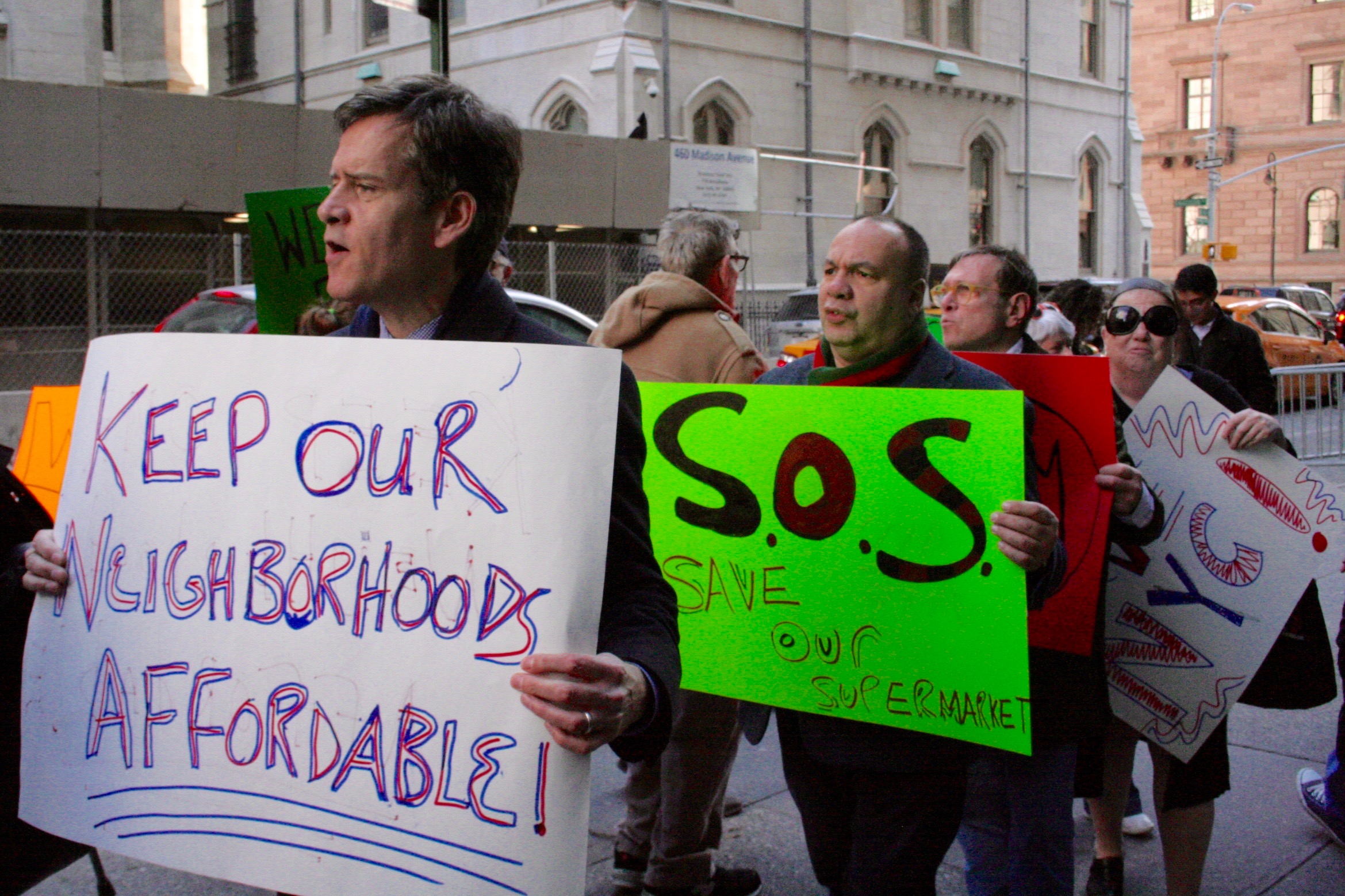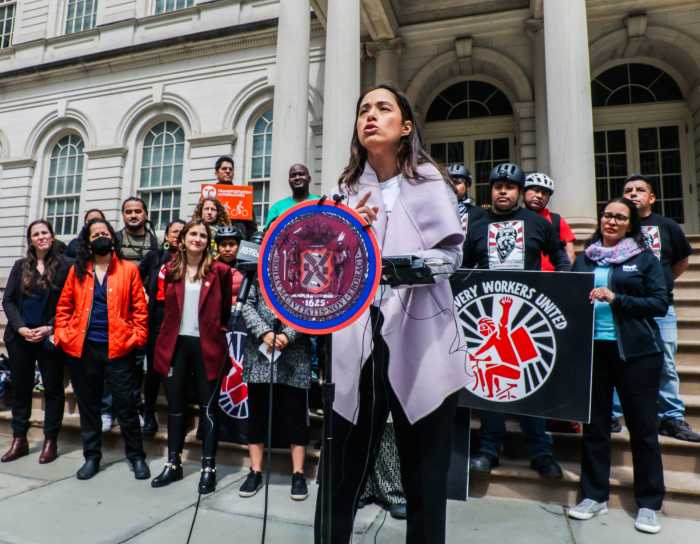
BY YANNIC RACK | Longtime Village and Chelsea residents took the fight to save their beloved neighborhood supermarket to the landlord’s doorstep this week, chanting and picketing in front of the Midtown headquarters of Pan Am Equities.
Supported by local politicians and representatives from other neighborhoods across the city, they rallied on the sidewalk in front of 18 E. 50th St., between Fifth and Madison Aves., to protest a threefold rent increase that is threatening to put the Associated supermarket at 255 W. 14th St. out of business and force it to shut its doors by May.
“This is just a continuation of us saying, ‘You’re not going to take an essential community service away from our neighborhood just because of greed. And we’re going to keep up the fight,’ ” said City Councilmember Corey Johnson, who organized the rally.
“It’s our hope that, in this day and age, a very wealthy real estate company will hopefully do what’s right,” Johnson told the protesters, “and not just try to make a little extra money on the backs of so many people who rely on this supermarket day in and day out for fresh fruits and vegetables, and for affordable groceries.”
Although the group that made the 20-minute trip to Midtown was decidedly smaller than the 100-plus crowd of locals that had shown up for another demonstration on W. 14th St. five days earlier, passions nonetheless ran high during the one-hour protest.
“It’s the destruction of small businesses,” proclaimed Charles Bayor, a member of Community Board 4 and a resident of Penn South. He voiced his disapproval with a bright red sign that read, “Don’t close our supermarket.”
Bayor, like many of the market’s patrons, said he regularly shops at the Associated because of its cheap prices.
“We’re losing all our stores that are affordable,” he said. “It’ll be very hard to exist in a neighborhood where everything is so expensive.”
Francine Haselkorn, standing next to Bayor with a sign that read “Save NYC!,” agreed.
“This is an essential issue,” said the Hell’s Kitchen resident. “It represents another nail in the coffin of what a middle-class person can do in New York City.”
One of the owners of the shop, which opened at its current spot between Seventh and Eighth Aves. in 1989, said last week that the landlord is demanding a monthly rent of more than $100,000, up from the current $32,000.
Many residents depend on the store, where they can buy fresh produce and even have their food delivered for free in a 10-block radius — an essential service for seniors and disabled residents of the area.
“A lot of middle-income folks, low-income families won’t have a place to buy fruits and vegetables anymore,” said state Senator Brad Hoylman, who marched together with the residents.
“[Pan Am] won’t even come to the table and negotiate, and that’s what irks me and so many members of our community,” he said. “Try to strike a fair deal, don’t price a long-standing business out of our community. That’s not right.
“It’s important that the community comes out, stands in front of their office, and lets the landlord know that it is not going to take this sitting down,” Hoylman added.
The picketers, holding up colorful signs and marching in a circle, gave their grievances vocal expression with chants that included, “Feed, Not Greed,” “Save Our Supermarket,” “Negotiate the Real Estate,” and “Shame on You, Pan Am.”
But the landlord did not respond or send a representative to address the protesters — prompting Johnson to inquire about a face-to-face meeting in the office building’s lobby. However, a receptionist told the councilmember that nobody was interested in engaging the protesters or him.
“They were instructed not to talk to us,” Johnson told the crowd outside.
“That means they’re already listening!” shouted one woman hopefully.

The company did not respond to a request for comment for this article.
Miguel Acevedo, who lives at the Fulton Houses public housing development and heads its tenant association, said the store’s closure would have far-ranging impacts on the neighborhood.
“That Associated and the Western Beef on W. 16th St. are the only supermarkets that are affordable in the community,” he said. “If we lose Associated, Western Beef will have the opportunity to raise their prices — so it’s going to really have an effect on the Chelsea community.”
Acevedo, who has lived in the nearly 1,000-apartment development all his life, remembered when Western Beef was still located on W. 14th St. and eventually forced out by a rent increase from that location — which led politicians to step in and help find a replacement space two blocks north, albeit half the size of the original store.
“If you take Associated away, it will definitely displace low-income tenants in our community,” he said. “We’re just going to get more Stella McCartney’s and Apple stores, that’s what they’ll probably put in there.”
Acevedo said the only real solution was to bring legislation supporting merchants’ right to a commercial lease renewal up for a vote in the City Council, where such a bill — the Small Business Jobs Survival Act — has been stalled for decades.
Johnson, who is a sponsor of the act, said there were doubts about the legality of the bill in its current form, but added that he was committed to resolving the issue.
“Commercial rent control existed in New York City for many, many years,” Johnson noted. “It was abolished decades ago, and I think given the crisis we’re seeing facing small businesses in the city, we have to bring some type of rent control or mediation back, so that small businesses can actually survive and not have their leases doubled, tripled, quadrupled, only to be driven out.
“The underlying problem is, if you walk through Greenwich Village, Chelsea, Hell’s Kitchen — really any neighborhood in Manhattan and the rest of the city — you will see not dozens of empty storefronts, but hundreds of empty storefronts. We’re losing the character of our city.”
Johnson added that, in the meantime, he would look for a way to keep the Associated in the neighborhood — though there don’t appear to be many options if the landlord continues to refuse to have an open discussion.
“I’m not 100 percent optimistic, but hopefully they’ll do the right thing,” the councilmember said.
Acevedo warned that if nothing is done soon, the future looks dire.
“The mom-and-pop stores, every week you see a different one closing down,” he said. “If you take the supermarkets away, it will become impossible to live in Chelsea.”
Similarly, Mark Felix, who lives near the corner of Horatio and Hudson Sts., complained that he soon won’t be able to afford living in New York City anymore.
“It’s the last affordable supermarket in the area,” he said of the Associated. “It’s ridiculous, raising the rent that much — I don’t think Whole Foods would pay that money.”
Village resident and Associated regular Martin Kornfeld and Claire August, another patron, signed a petition to keep the store open.
“You gotta get in their faces,” Kornfeld said of the landlord. “That’s the only way you can get them to do anything.”
Support was also present in the form of a representative for Local 338 of the Retail, Wholesale and Department Store Union, the labor group of the workers at the supermarket.





































